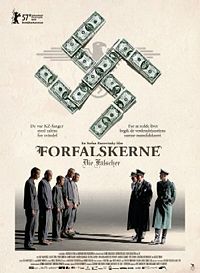The Counterfeiters is a fictionalised account of an astonishing true story: Nazi Germany’s Operation Bernhard, the largest counterfeiting undertaking in history. The operation forced Jewish concentration camp prisoners to produce forged banknotes, passports and even postage stamps for the benefit of the Third Reich.
The movie is based on the memoirs of one of the participants, Adolf Burger. A communist printer, Burger urges his fellow inmates to sabotage the project of forging the American Dollar, in order to undermine the Nazi war effort.
The central character is a professional forger, Saloman Solowich. In the early scenes of the film we see, Solowich, “the most charming scoundrel in Berlin”, quaffing Champagne in the bohemian decadence of Weimar Germany. When he ends up in a concentration camp, his strategy is simple: adapt and survive.
On his arrival at Operation Bernhard, Solowich meets a gentleman who introduces himself: “Dr Viktor Hahn, Royal Prussian Credit Bank Hamburg”. Hahn is outraged when he notices Solowich’s green triangle badge (signifiying a “habitual criminal”), objecting that “honour is all one has left.”
Later on in the film, Solowich reveals that he has a code of honour of his own, when tells a fellow prisoner who wants to expose Burger’s sabotage: “you don’t squeal on your mates.”
The film probes the moral and political dilemmas of the prisoners. They enjoy small privileges in their special compound, and form a kind of concentration camp labour aristocracy. But the sound of gunshots and brutality is never far away, and the psychological pressure is intense.
Adolf Burger is interviewed on the DVD extras, where he explains that for 20 years after the liberation of the camps, he chose not to talk about the past. What spurred him to break his silence was the emergence of Holocaust Denial by Neo-Nazis. He wrote his book The Devil’s Workshop, because he wanted people to know that the Nazis were not only murderers, but also counterfeiters.
The Counterfeiters has many scenes of great pathos, but one that stands out is when the banker Hahn protests to an SS officer that he is a respectable man who has been coerced into producing forgeries; the Nazi reacts with callous laughter. Here the extraordinary circumstances of the drama reveal that the labour of both criminal and banker are necessary for the functioning of capitalism. This idea was expanded by Karl Marx in a deeply ironic passage entitled “The Apologist Conception of the Productivity of All Professions” in his work Theories of Surplus Value:
“A philosopher produces ideas, a poet poems, a clergyman sermons, a professor compendia and so on. A criminal produces crimes. If we look a little closer at the connection between this latter branch of production and society as a whole, we shall rid ourselves of many prejudices. The criminal produces not only crimes but also criminal law, and with this also the professor who gives lectures on criminal law…
“The criminal moreover produces the whole of the police and of criminal justice, constables, judges, hangmen, juries, etc.; and all these different lines of business, which form equally many categories of the social division of labour, develop different capacities of the human spirit, create new needs and new ways of satisfying them. Torture alone has given rise to the most ingenious mechanical inventions, and employed many honourable craftsmen in the production of its instruments.
“The effects of the criminal on the development of productive power can be shown in detail. Would locks ever have reached their present degree of excellence had there been no thieves? Would the making of bank-notes have reached its present perfection had there been no forgers? … Crime, through its constantly new methods of attack on property, constantly calls into being new methods of defence, and so is as productive as strikes for the invention of machines. And if one leaves the sphere of private crime: would the world-market ever have come into being but for national crime? Indeed, would even the nations have arisen? And hasn’t the Tree of Sin been at the same time the Tree of Knowledge ever since the time of Adam?”
Mike Kay
